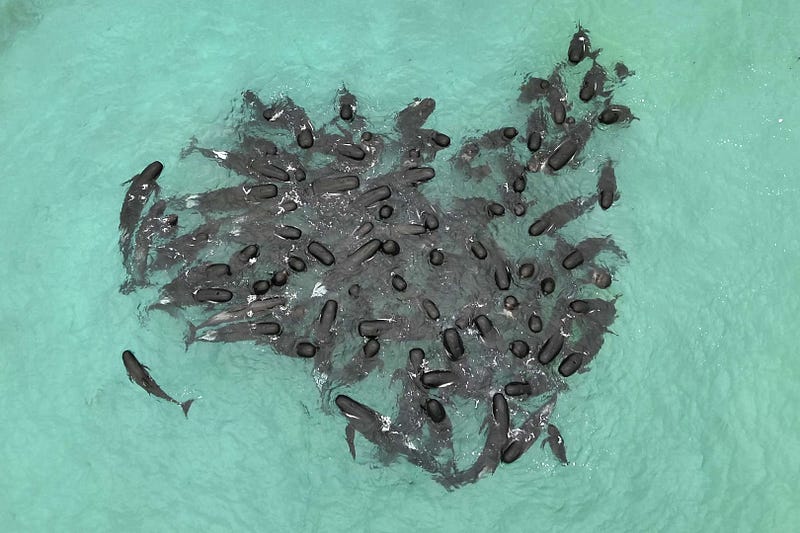Wail of the Whales
On July 25, 2023, a pod of close to 100 pilot whales were seen behaving bizarrely in the shallow waters off the coast of Western Australia. They were clustered tightly together, forming a heart shape at one point and making noises that seemed to express distress. Later that same day the pod rushed to the shore, beaching themselves. Fifty-two died on the beach and the remaining 45 were euthanized after they continually returned to the beach after wildlife officers and volunteers led them to deep waters.
Strandings like these have happened before. What's different this time is that there's footage captured by drones of what happened before the whales beached themselves. Pilot whales have strong social family connections within their pods.
Wildlife experts will be studying the footage and working to learn more about the stranding phenomena. At this point, some experts are speculating it could be an indicator of stress or illness within the pod.
When members of their pods are suffering, could the pilot whales, who are highly social and connected animals, see no other option but to die together?
We will get through this
Humans are able to persevere after tragic events, especially when they are emotionally strong and supported.
Last November, a drunk driver of a semi-truck slammed into the St. Ignatius College Prep hockey team's bus, carrying 23 students and two hockey coaches.
Many students were hurt and three severely injured. All involved were emotionally shook-up.
At the time of the crash, the St. Ignatius High school's hockey president, Matt Connelly said to me, "We will get through this. We always do."
Those who were on the bus are getting through it-in large part due to their pod of support, and the love that was and continues to surround them.
They experienced first hand how you take action, provide support in horrific situations and show up for those in need-from the stranger who stopped and helped get the injured people off the bus, to the first responders, to the parents and the school community who showered the group with affection and attention for months.
The hockey players and coaches will tell the story of what happened to them on November 12, 2022, and how they recovered for years to come.
Stories We Tell
As humans, we have the ability to recover from trauma by re-telling what happened to us. When we find the words for our hard stories and tell them to people who care, we heal.
When I was at Marquette in the eighties studying engineering, I worked at the Counseling Center as a student "para-professional." My job was to design and provide workshops for other students. In one of the workshops we played a video by Dr. Leo Buscaglia who talked about how to share ourselves in life's largest experience-LOVE. Leo had lots of great quotes. My favorite was something like:
You have to tell those you love your stories. You say, "sit down, I am going to tell you a story about your family." If they grumble, you tell them the story anyway. Lessons of love need to shared.
This summer I heard several family stories at two celebrations. The stories were part of games that required 100 percent participation of the guests!
Besides it being fun to learn about those relatives who came before me, it was amazing to hear the stories of ancestors who persevered through incredible hardship and went on have a good life.
Workplace Stories
Stories remind us that like other humans we can preserve through hard times. When I work with leaders and teams doing the hard work of implementing change, I am conscious that stories will be told when the work is done and sometimes while we are doing it.
These stories create a connection and show team members we are stronger together.
My favorite clients to work with are the ones who bring their team members together to work through tough decision, after tough decision and do it in a respectful way.
Together, we create the right environment for people to raise concerns and collaborate on solutions rather than feeling that they have no control over the changes coming.
The result is less stress for the people being impacted by the changes, the implementation is smoother for the leaders, and the overall benefits of the changes are realized sooner for the company.
Leaders like my clients, understand most employees want to work, and work on the right things. Plus, work is more rewarding when one gets to be part of creating a solution.
Everyone wants to be part of the story of how we worked hard, persevered, and made things better, as a team.
Key Points
We all need a pod — the small circle of people who keep us buoyant when the current gets rough.
Great leaders don’t go it alone; they build networks of trust and reciprocity that make sustained courage possible.

